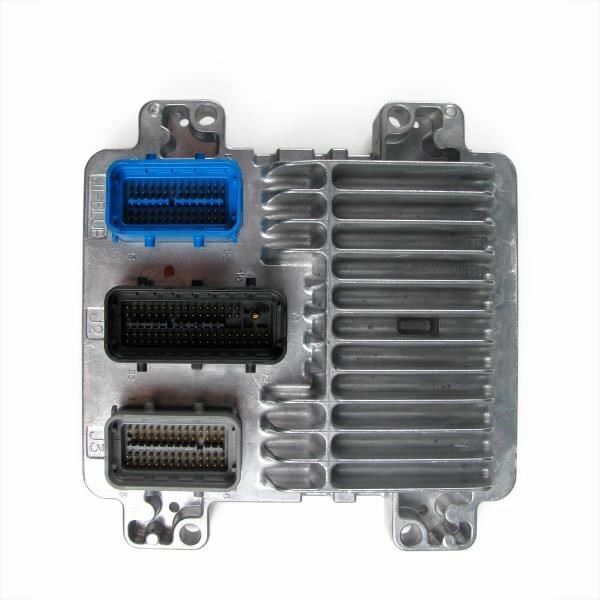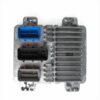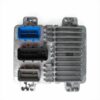Is Your 2006 Rainier Running Rough? The PCM Might Be the Culprit.
The Powertrain Control Module (PCM), often called the Engine Control Module (ECM), is the central computer of your 2006 Buick Rainier. It’s the brain behind the brawn, meticulously managing everything from fuel injection and ignition timing to transmission shift points and emissions controls. When this vital component begins to fail, it can cause a cascade of confusing and frustrating problems, leaving you stranded or dealing with a vehicle that’s unreliable and inefficient. If you’re experiencing erratic engine behavior, a persistent Check Engine Light, or other perplexing electrical issues, you’ve come to the right place for a dependable solution.
From the Diagnostic Bay
We had a 2006 GMC Envoy—a sibling to the Rainier with the same 4.2L engine—come into the shop with a bizarre complaint. The owner said it would randomly stall at stoplights, but only after it was fully warmed up. The Check Engine Light was on, but the codes were all over the place: random misfires, a communication error with the transmission module, and an O2 sensor code. We checked wiring, sensors, and grounds, but everything looked solid. On a hunch, we monitored the PCM’s live data stream. We noticed that as the engine bay temperature climbed, the data output from the PCM would become erratic before cutting out entirely, causing the stall. The internal processor was failing under heat. Replacing the PCM with a properly programmed unit solved every single issue instantly. It’s a classic example of how a single faulty module can mimic a dozen other problems.
Common Symptoms of a Failing 2006 Rainier PCM
- ✔ Check Engine Light: The most common sign. The light may be on constantly or intermittently, often with codes related to module communication (U-codes), sensor circuits, or processor faults (P06xx codes).
- ✔ Poor Engine Performance: You might notice a significant drop in power, hesitation during acceleration, or rough idling as the PCM struggles to manage the engine correctly.
- ✔ Reduced Fuel Economy: If the PCM isn’t calculating the air-fuel mixture properly, your Rainier will consume more gasoline than usual.
- ✔ Engine Stalling or No-Start: The engine may stall for no apparent reason, either while driving or at idle. In severe cases, a complete PCM failure can prevent the engine from starting at all.
- ✔ Harsh or Erratic Shifting: The PCM also controls the transmission. A faulty module can lead to delayed, hard, or unpredictable gear changes.
- ✔ Failure to Pass Emissions Test: An improperly functioning PCM will not be able to manage the vehicle’s emissions systems, leading to an automatic failure at the inspection station.
The Direct-Fit, Programmed Solution: Part #12593531
This isn’t just a generic, off-the-shelf part. This is a Powertrain Control Module specifically prepared for your vehicle. We take the hassle and guesswork out of the repair by programming the module with the latest GM-certified software updates using the unique Vehicle Identification Number (VIN) you provide. This ensures that the computer is a perfect match for your Rainier’s specific configuration, including its engine, transmission, and factory options. The result is a simple, plug-and-play installation process that restores your vehicle’s original performance and reliability.
This module is a direct replacement for a wide range of original equipment part numbers, including: 12569773, 12588650, 12589311, 12589585, 12591647, 12591648, 12593531, 12593532, 12594430, 12594431, 12596783, 12596784, 12597521, 12597776, 12597777, 12600818, 12604438, 12604439, 12606369, 12606373, 12606374, 12606398, 12606399, 19209820, and 19209821.
Wide Compatibility Across GM Platforms
While this is the correct 2006 Rainier PCM, it also fits a variety of other GM trucks and SUVs from the same era that share the GMT360 platform and related architectures. This includes:
- 2006 Buick Rainier (4.2L)
- 2006 Chevrolet Trailblazer & Trailblazer EXT (4.2L)
- 2006 GMC Envoy & Envoy XL (4.2L)
- 2004-2006 Chevrolet Colorado
- 2004-2006 GMC Canyon
- 2006 Hummer H3
- 2006 Isuzu Ascender (4.2L)
- 2006 Isuzu i-280 & i-350
- 2006 Saab 9-7x (6 cylinder)
Frequently Asked Questions
What exactly does the PCM do?
The Powertrain Control Module is your vehicle’s main computer. It processes data from dozens of sensors around the engine and transmission to control fuel delivery, spark timing, emissions equipment, and automatic transmission shifting. A properly functioning PCM is essential for a smooth, efficient, and reliable driving experience.
Is this module difficult to install?
For most DIY mechanics with basic tools, this is a straightforward job. The PCM on the 2006 Rainier is located on the driver’s side of the engine bay. The process involves disconnecting the battery, unplugging the electrical connectors from the old module, unbolting it, and then installing the new one in the reverse order. Since we program it beforehand, no special tools are needed for setup.
How do I provide my vehicle’s VIN?
After you complete your purchase, you will receive instructions on how to send us your 17-digit VIN. We cannot ship your part until we have this information, as the programming is specific to your exact vehicle. You can typically find your VIN on the driver’s side dashboard (visible through the windshield) or on the driver’s side door jamb sticker.
Will I need to do anything after installation?
In most cases, the module is ready to go right out of the box. However, some vehicles may require a Crankshaft Position System Variation (CASE) relearn procedure to clear certain trouble codes and ensure optimal performance. This is a simple procedure that can be performed by most repair shops or with a high-quality bi-directional scan tool.
Will this part fix my Check Engine Light?
If the Check Engine Light is caused by a faulty PCM, then yes, this replacement part will resolve the issue. However, it’s crucial to properly diagnose the problem first. The Check Engine Light can be triggered by many other components, such as a bad sensor or a loose gas cap. We recommend having the codes read to confirm the PCM is the likely source of the problem.


